Did you know that over 4.5 million dog bites occur in the U.S. every year?
While most dogs are friendly, some breeds are naturally gentler and less prone to biting. Whether you’re a family with kids, a first-time dog owner, or someone who simply wants a stress-free companion, picking a breed with a calm temperament is key.
Of course, every dog’s behavior depends on training and environment, but some breeds stand out for their sweet, easygoing nature. If you’re looking for a loyal, affectionate, and safe furry friend, these seven breeds are known to be among the least likely to bite.
Let’s dive in and find your perfect gentle companion!
Dog Breeds Least Likely to Bite
1. French Bulldog

Compact, charming, and utterly lovable, the French Bulldog has a fascinating history that traces back to the lace-making artisans of 19th-century England. These small bulldogs accompanied their owners to France, where they quickly gained popularity among Parisian society.
With an outgoing nature and an affectionate temperament, the French Bulldog thrives on companionship. They are known for their playful yet relaxed demeanor, making them wonderful lap dogs. Despite their stubborn streak, their loyalty and desire for human connection shine through, ensuring they remain one of the most beloved small breeds.
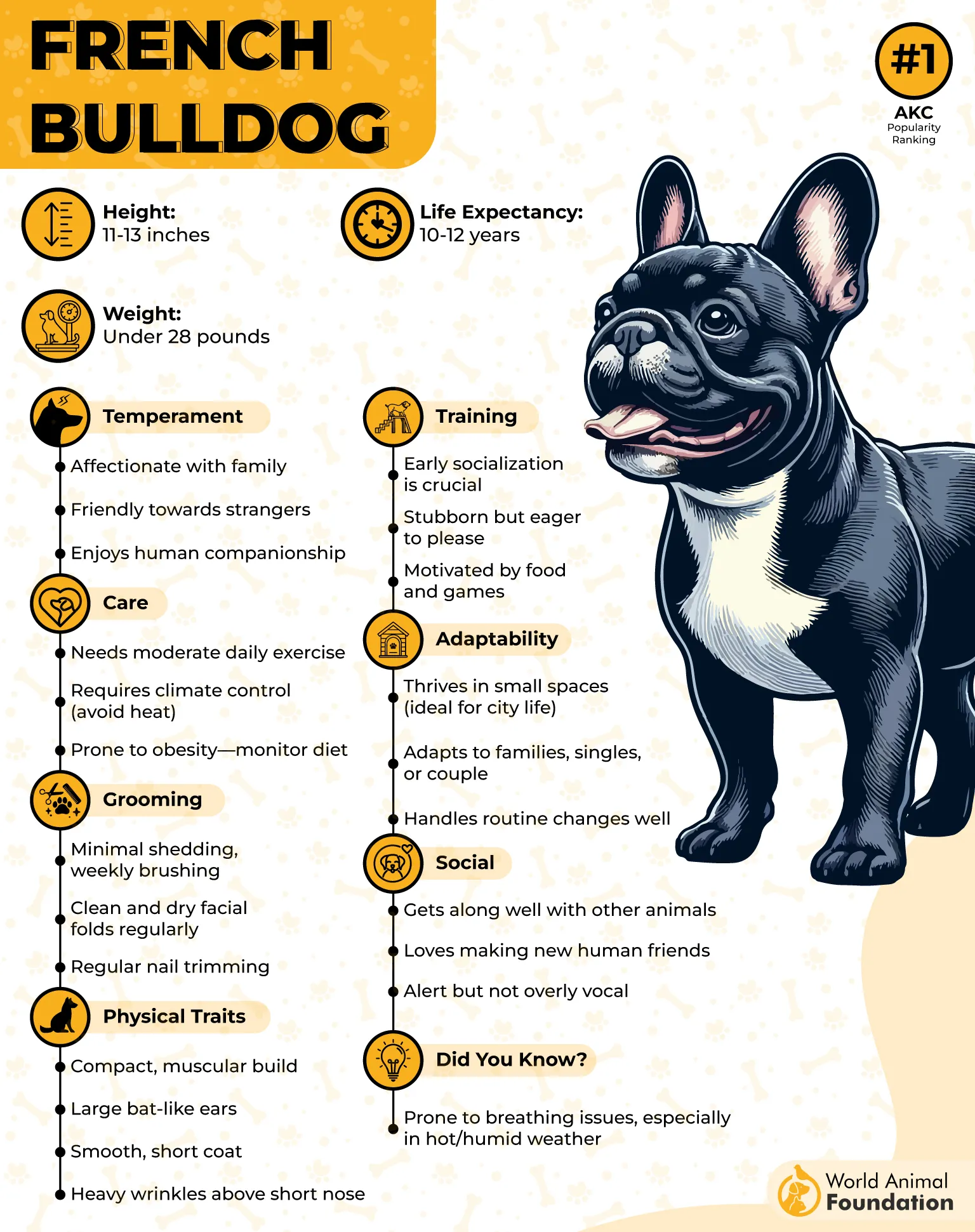
Frenchies are highly social and get along well with other dogs, children, and even strangers as per PDSA. Their gentle disposition and love for attention make them a fantastic choice for homes with multiple pets. While they may act aloof at times, their hearts are filled with warmth, always seeking cuddles and belly rubs.
Training a Frenchie requires patience and consistency, as they can be a bit headstrong. However, their eagerness to please makes them trainable with positive reinforcement. Short, engaging sessions work best, as they tend to lose interest quickly. Treats and praise go a long way in keeping them motivated.
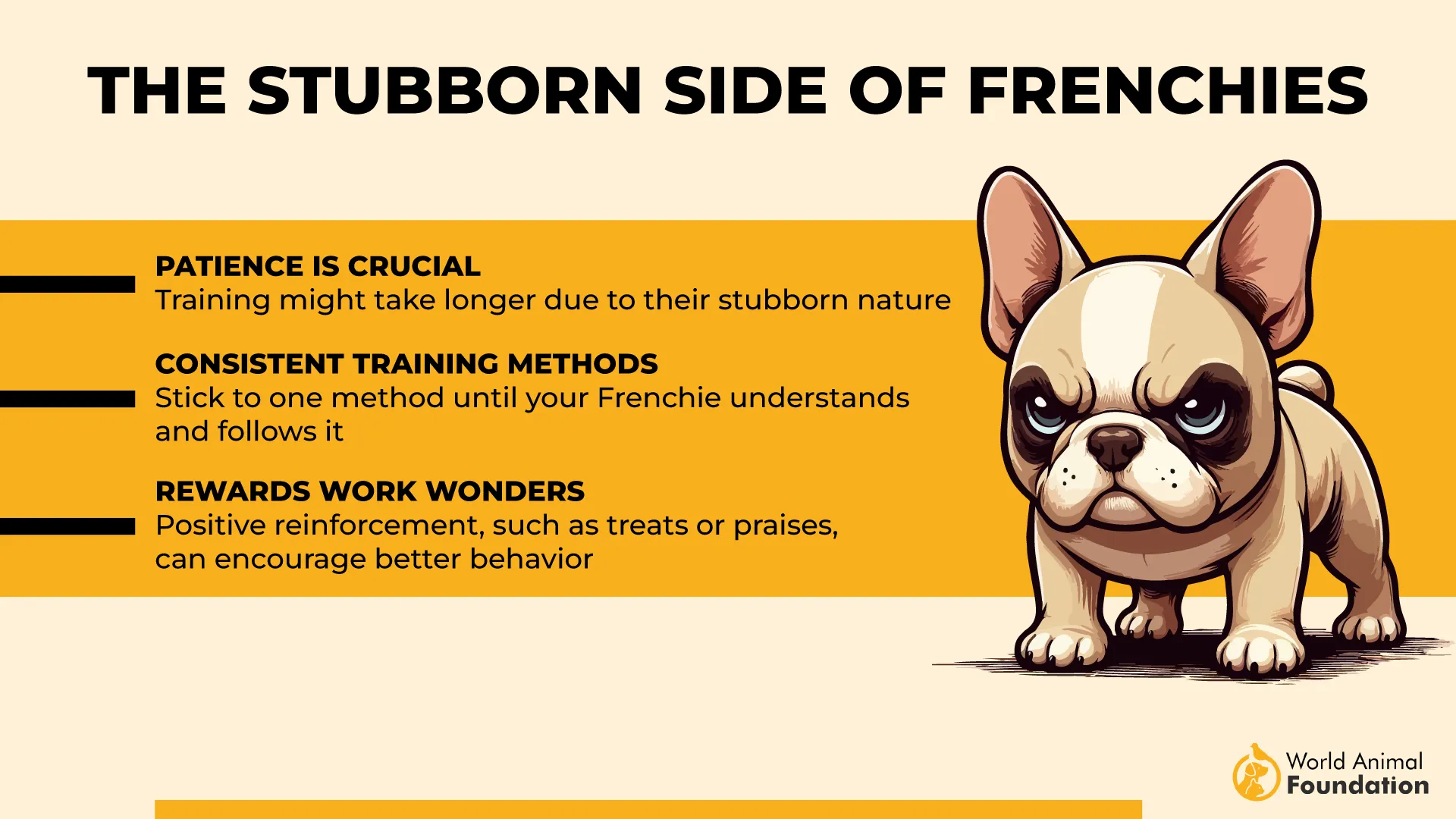
Among dog breeds, Frenchies have a relatively low bite risk. Their easygoing and friendly temperament means they are rarely aggressive. While any dog can bite under extreme stress, proper socialization and training make Frenchies one of the safest dog breeds to have as a companion.
2. Labrador Retriever

If there were a popularity contest for dogs, the Labrador Retriever would be winning every year! Originally bred as fishing companions in Newfoundland, these gentle giants made their way to England, where they became the ultimate hunting and retrieving dogs. Fast forward to today, and they’re not just working dogs—they’re couch cuddlers, fetch champions, and the best buddies anyone could ask for.
Labradors have an incredibly loyal nature that makes them perfect for family environments. They adore their humans, whether it’s keeping up with active kids or curling up next to grandma. Their boundless enthusiasm and friendly demeanor make them the kind of dog that greets you like you’ve been gone for a decade—even if it was just a trip to the mailbox!
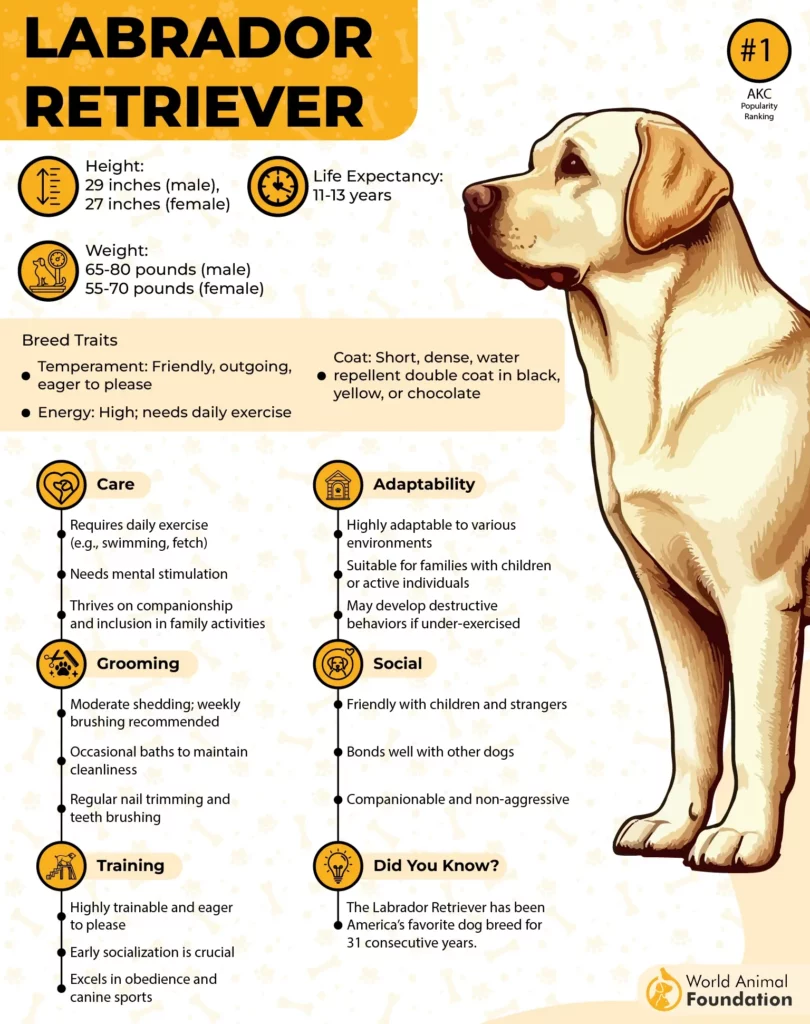
Social butterflies by nature, Labs get along with just about everyone—kids, strangers, other dogs, and even the neighbor’s cat (well, most of the time). They thrive in interactive households where they can be part of the action, whether it’s a backyard game of fetch or a snuggle session on the couch.
Training a large dog like a Labrador? Surprisingly easy! These smarty-paws are eager to please and respond well to positive reinforcement. They love learning new tricks, which means prospective owners should be ready to keep them mentally and physically stimulated—otherwise, say goodbye to your favorite pair of shoes!
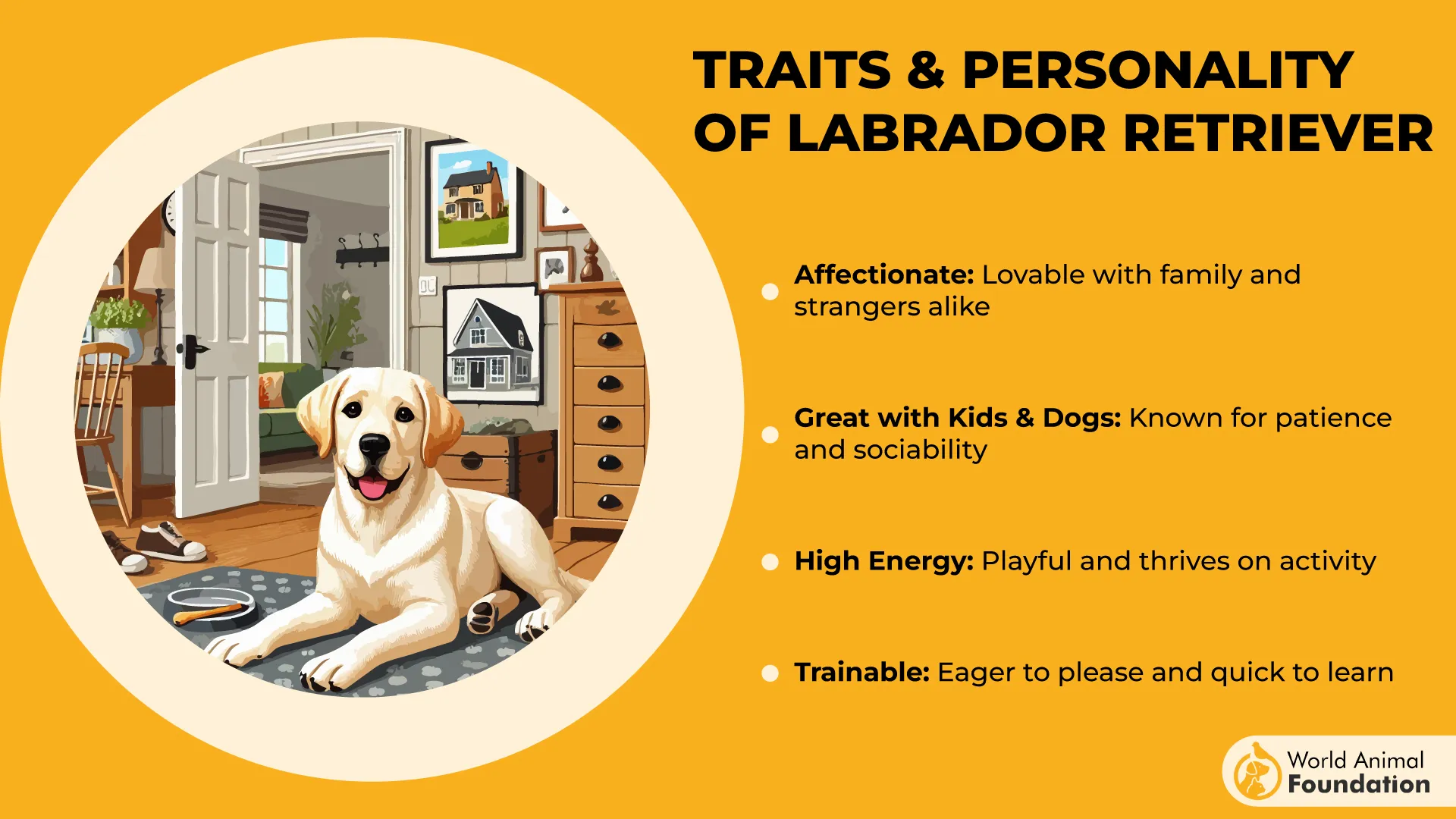
When it comes to aggressive behaviors, Labrador Retrievers rank among the lowest. They are naturally gentle and rarely show signs of aggression unless provoked or in extreme situations. Their friendly, people-loving nature makes them one of the safest and most trustworthy companions anyone could have.
3. Golden Retriever

Golden Retrievers weren’t just made to be dogs—they were made to be happy in fluffy form! Originally bred in Scotland to retrieve game from water, these golden beauties quickly traded in their hunting days for a life of belly rubs and tail wags. With their soulful eyes and ever-wagging tails, they’ve perfected the art of making humans smile.
Known for their friendly disposition, Golden Retrievers are walking, barking rays of sunshine. They radiate warmth and enthusiasm, greeting everyone as if they’ve been best friends forever. Whether it’s chasing tennis balls or simply lounging at your feet, they’re just happy to be part of the moment.

Goldens are social butterflies that get along with everyone—kids, strangers, and, of course, pets of all shapes and sizes. They don’t just tolerate other animals; they enjoy spending time with them. If there were a competition for the friendliest dog at the park, a Golden would take home the trophy (and probably try to share it with their new best friend).
Training this retriever is as easy as convincing them to play fetch, as mentioned in Orvis. They love learning and respond well to positive reinforcement. They’ll do just about anything for a treat, a toy, or even just a “good boy!” in an excited voice.
When it comes to bite risk, Goldens are about as threatening as a stuffed animal. They are among the least aggressive breeds and are more likely to shower someone with kisses than display any form of hostility. With their loving nature and a deep desire to spend time with their favorite people, they make one of the safest and most affectionate companions.
4. Cavalier King Charles Spaniel

Royalty in the dog world? Absolutely! The Cavalier King Charles Spaniel was once the lapdog of kings and queens, and honestly, they still carry themselves like tiny, four-legged nobles. These elegant little pups were bred for companionship, and today, they’re experts at curling up on laps, offering endless cuddles, and staring into your soul with those irresistible puppy-dog eyes.
Despite their regal roots, Cavaliers are far from snobby. They’re playful, full of affection, and always eager to make new friends—whether human or furry. Their adaptable personality makes them equally happy chasing a ball in the backyard or snuggling under a blanket for a cozy nap.
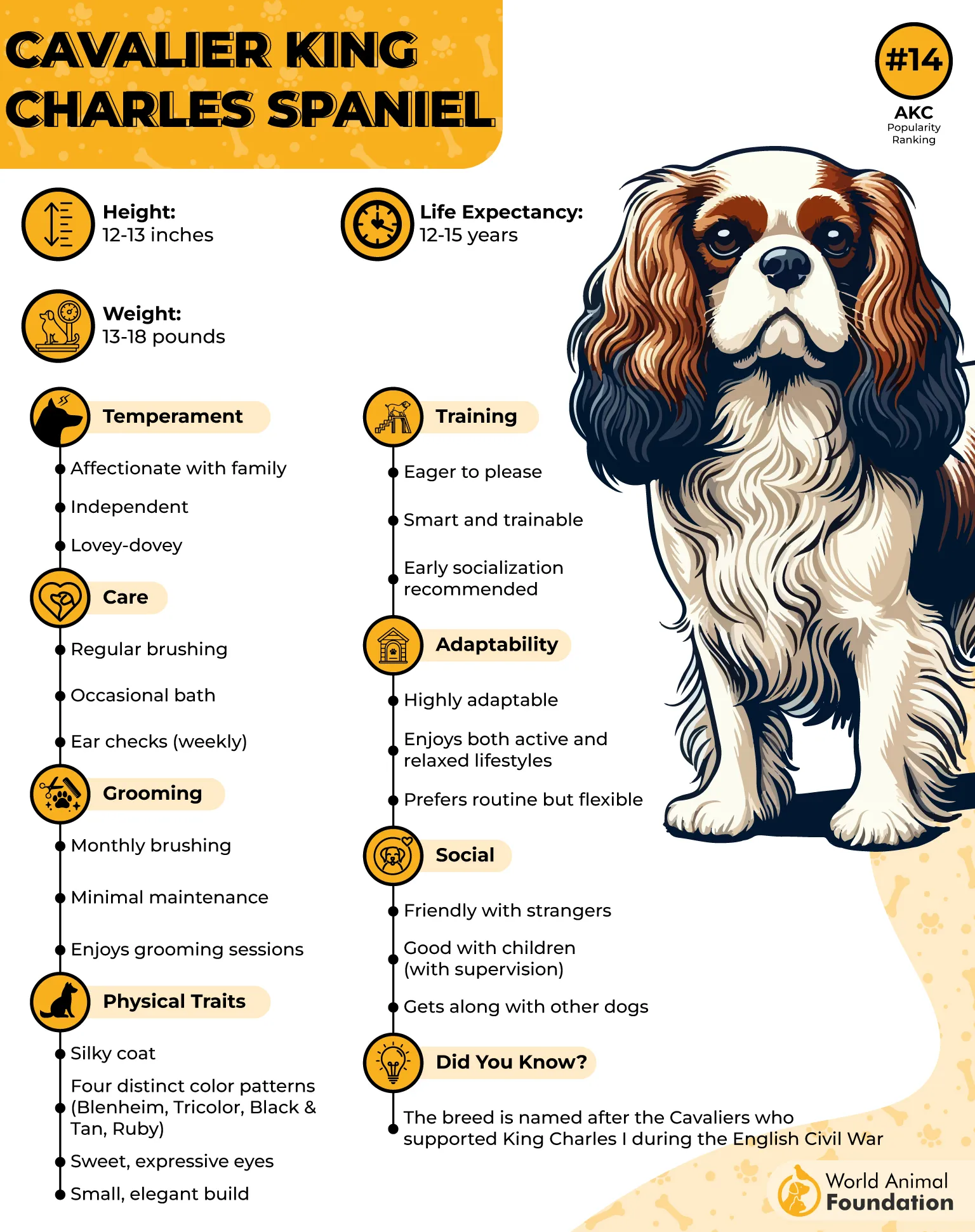
When it comes to socializing, Cavaliers are pros. They adore kids, welcome strangers with wagging tails, and get along effortlessly with pets of all shapes and sizes. Whether it’s a big dog, a cat, or even a curious guinea pig, they’re more likely to make a new best friend than cause any trouble.
Don’t let their small size fool you—these little charmers are intelligent and quick learners. They thrive on positive reinforcement and are always up for a fun training session (especially if treats are involved). Teaching them tricks or house rules is a breeze, and they’ll master commands with a happy tail wag.
As for bite risk? Cavaliers are lovers, not fighters. They’d much rather lick someone into submission than show aggression. Even as puppies, their gentle nature shines through, making them one of the safest breeds for families and households with multiple pets.
5. Newfoundland
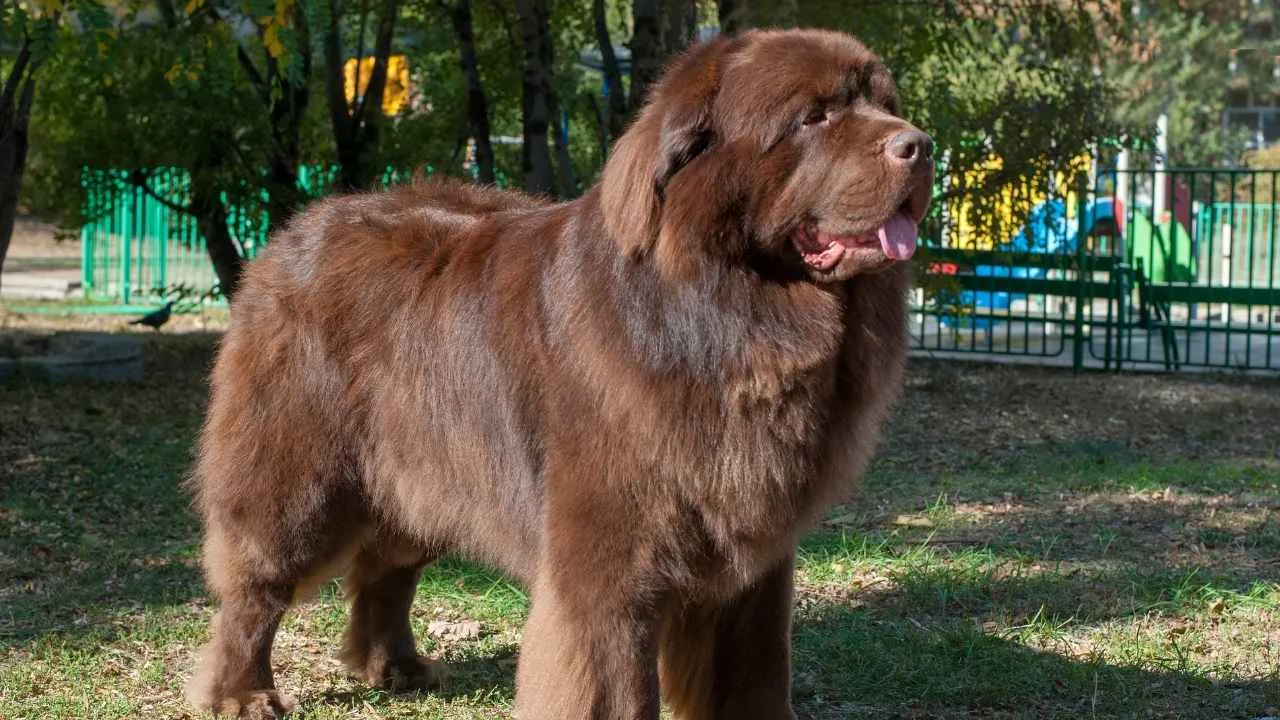
Imagine a dog so fluffy and gentle that it could double as a giant, walking teddy bear. That’s the Newfoundland for you! Originally bred as working dogs in Canada, these sweet giants helped fishermen haul nets, rescue people from the water, and, let’s be honest, probably stole a few fish along the way. Today, they’re known for their affectionate nature and devotion to their families.
Newfoundlands aren’t just big in size—they have even bigger hearts. These dogs are patient, loving, and endlessly loyal, making them a great choice for families, especially those with kids. Their calm and gentle personality makes them fantastic babysitters (think Nana from Peter Pan), and they take their role as a family protector very seriously.
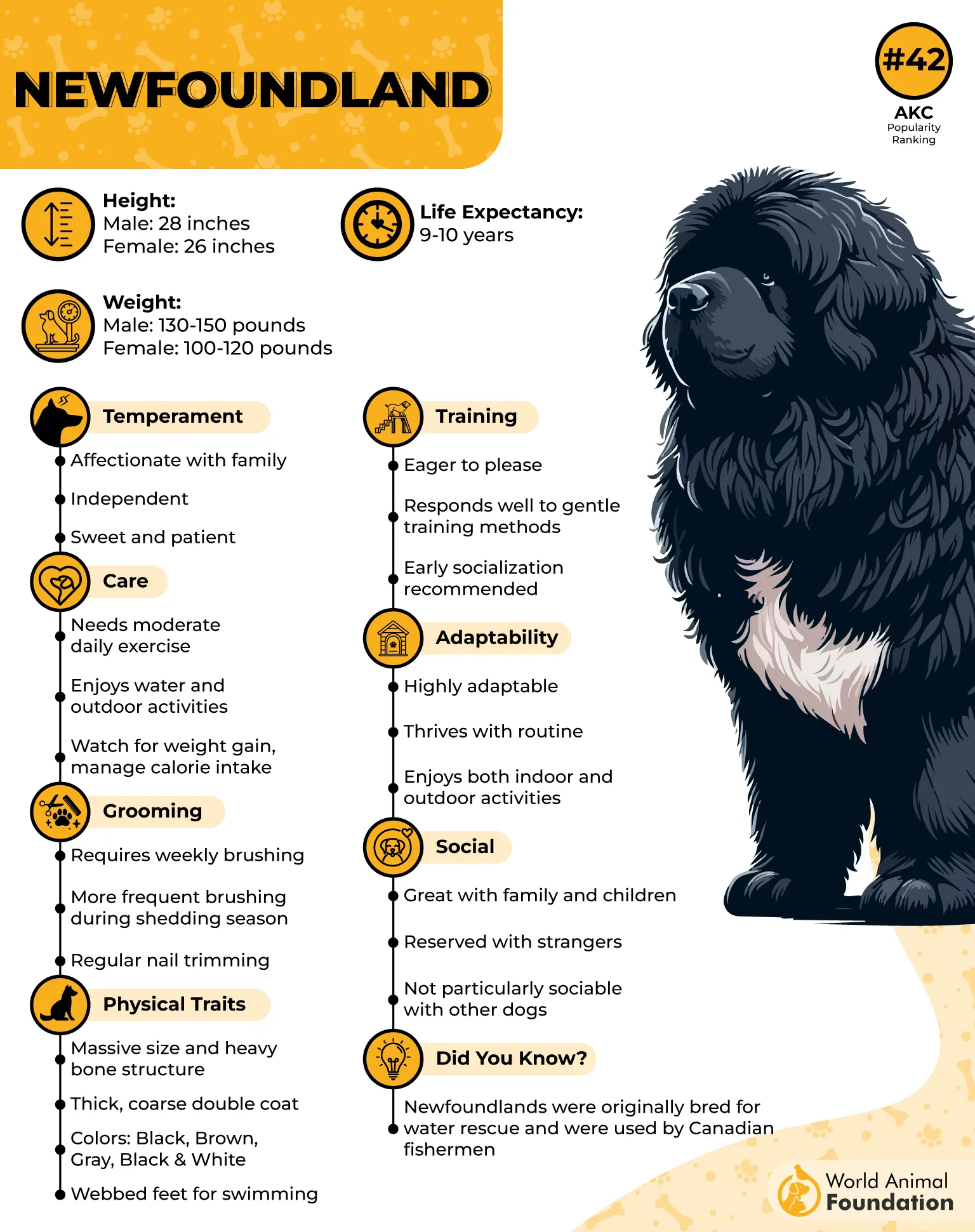
Despite their size, Newfoundlands are incredibly social as WebMD stated. They love meeting new people, playing with other dogs, and even tolerating the occasional cat that wanders into their space. If someone new comes over, a Newfoundland is more likely to greet them with a drooly kiss than a growl.
When it comes to training, these big fluffballs are eager to please but can have a stubborn streak. They respond best to positive reinforcement, and they thrive in environments where they get plenty of mental stimulation and exercise. A daily walk, some playtime, or even a swim (they love water) will keep them happy and well-behaved.
Aggression? Not in them. A Newfoundland would rather share its food than fight, and they’re so patient that even a mischievous toddler pulling their tail won’t faze them. For good reason, they’re often called “gentle giants” and are one of the safest breeds when it comes to bite risk.
6. Whippet

The Whippet is the definition of speed and elegance, wrapped up in a sleek, aerodynamic body. Originally bred for hunting and racing, these slender pups can reach impressive speeds, but when they’re not zooming around, they’re expert couch loungers. Despite their athletic build, Whippets are generally calm, affectionate, and incredibly loving companions.
With a personality as smooth as their sprint, Whippets are gentle, friendly, and surprisingly low-maintenance. They form deep bonds with their humans and thrive in peaceful, affectionate homes. Their energy comes in short bursts—one minute they’re dashing across the yard, and the next, they’re curled up beside you for a nap.
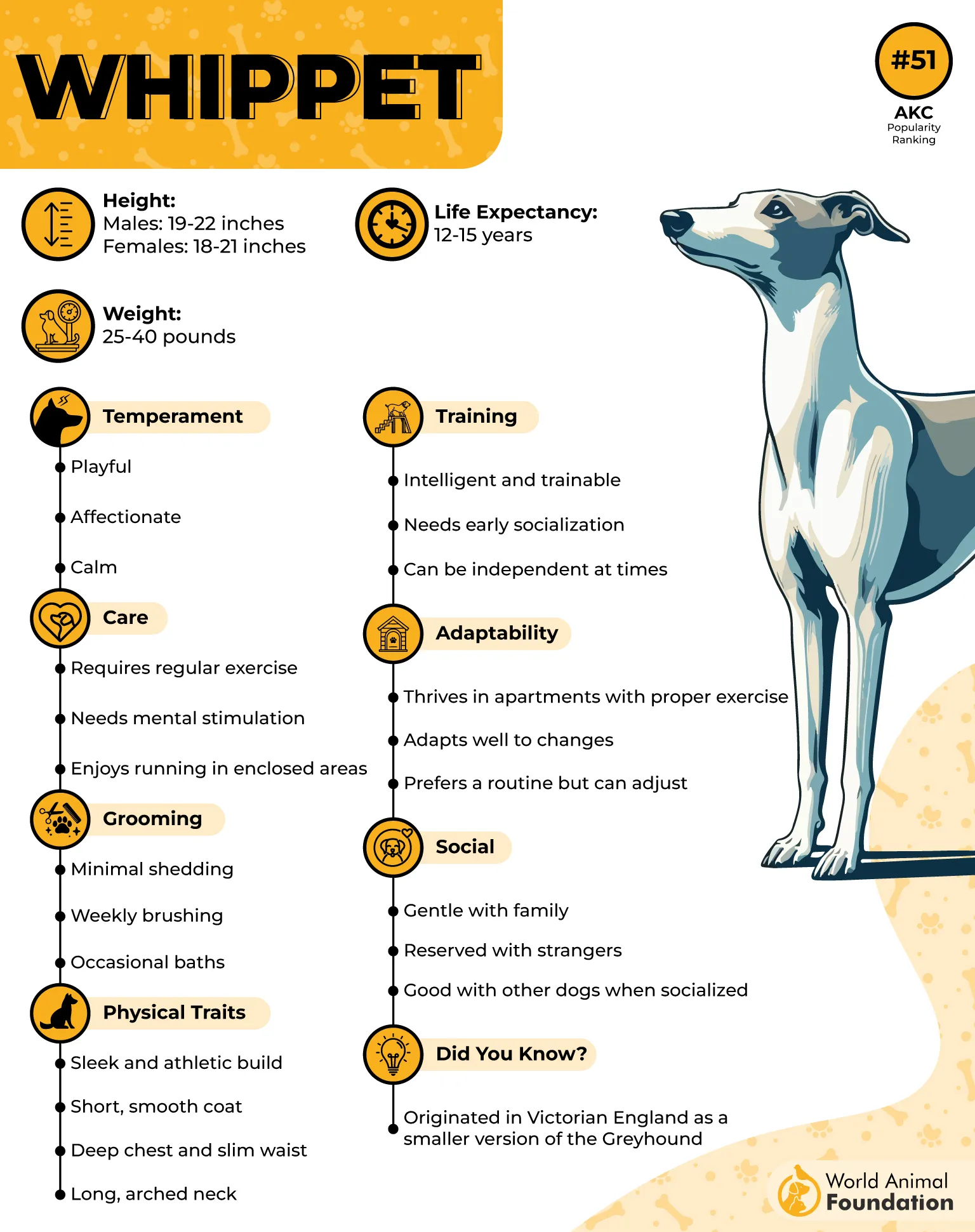
Social by nature, Whippets enjoy the company of their family and other pets. They’re generally good with children and get along well with other dogs, especially those who share their love for a good sprint. However, their high prey drive means smaller animals might spark their natural chase instinct.
Training a Whippet is a rewarding experience. They’re intelligent and responsive, but they do best with positive reinforcement and gentle guidance. Harsh training methods won’t work with this sensitive breed, as they prefer encouragement over correction.
When it comes to bite risk, Whippets are one of the safest breeds. They have no interest in causing harm and are more likely to run away from conflict than engage in it. With their sweet, mild-mannered temperament, these graceful pups make wonderful companions for those looking for a loving, low-aggression breed.
7. Beagle

The Beagle is a bundle of joy wrapped in floppy ears and an ever-wagging tail. This breed is well known for its keen sense of smell and detective-level curiosity, always ready to follow an interesting scent—sometimes right into trouble! Originally bred for hunting, Beagles are energetic, friendly, and full of enthusiasm for life.
Despite their tracking instincts, Beagles are incredibly calm when indoors. They love lounging beside their humans just as much as they love an outdoor adventure. Their even-tempered nature makes them ideal family pets, as they adapt well to different environments and routines.
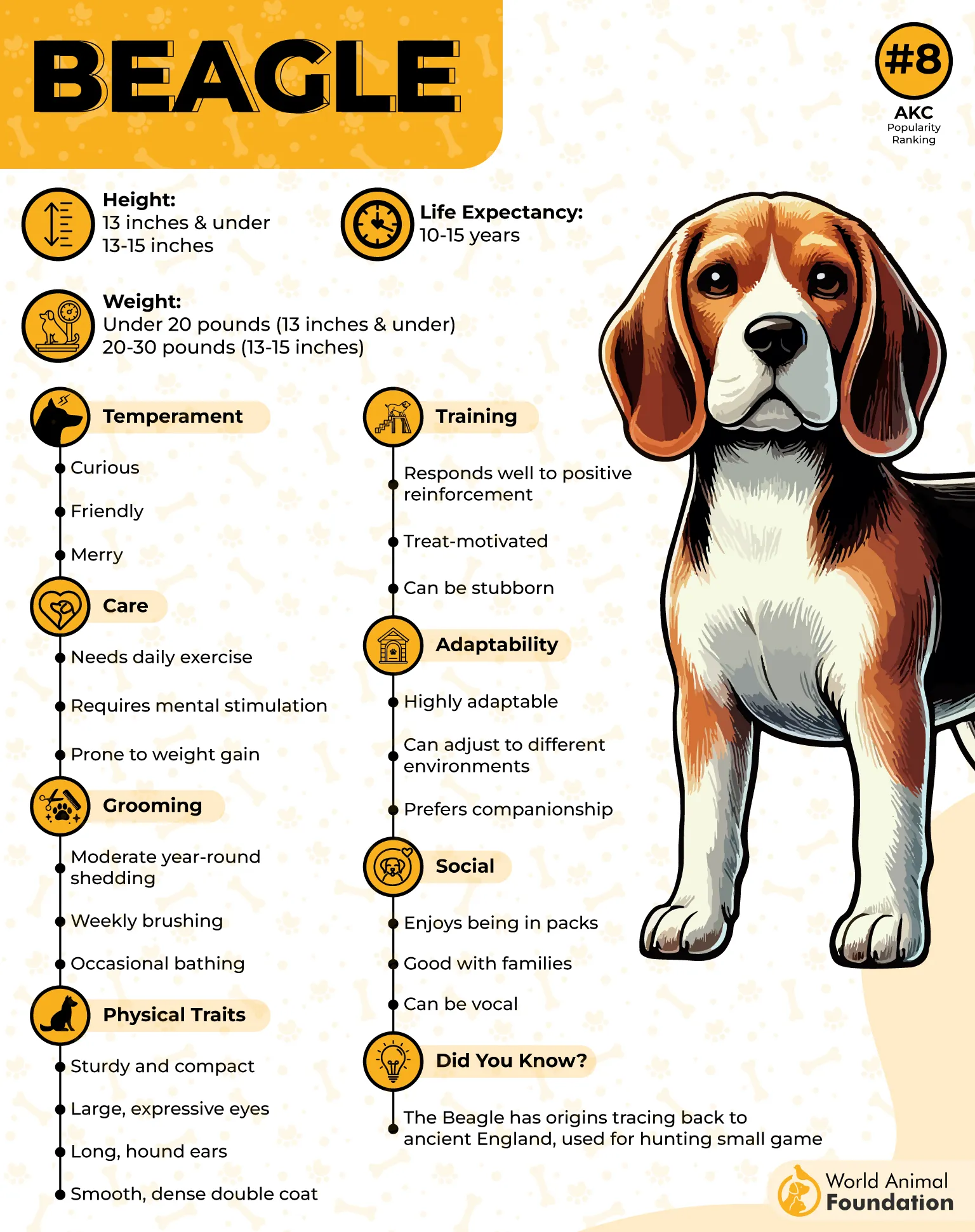
When it comes to social skills, these little hounds are experts! Beagles thrive in the company of their families, children, and even other pets. Their playful attitude keeps everyone entertained, whether they’re zooming around the yard or flopping over for belly rubs.
Training a Beagle requires patience, thanks to their independent streak. They’re intelligent but easily distracted—especially if an interesting scent catches their nose. With consistency and positive reinforcement, though, they become well-mannered companions.
As for bite risk, Beagles are not known for aggression. Their playful and calm temperament makes them unlikely to snap or show hostility. If anything, their biggest crime is stealing snacks! Anyone interested in a fun-loving, affectionate, and easygoing pup will find the Beagle to be the perfect match.
Conclusion
When it comes to choosing a gentle and trustworthy dog, the breeds on this list stand out for their friendly nature and minimal bite risk. From the affectionate Bernese Mountain Dogs to the ever-charming Pugs, these dogs have earned their reputation as some of the most reliable companions.
Each of these breeds brings something unique to the table. The laid-back Basset Hound is perfect for relaxed households, while the lively Irish Setter adds energy and excitement to an active family. No matter the preference, there’s a lovable, low-risk breed for everyone.
Training, socialization, and responsible ownership play a crucial role in a dog’s behavior. Even the most docile breeds need guidance and positive reinforcement to ensure they remain well-mannered. A loving home and proper training go a long way in shaping a dog’s temperament.
Choosing a breed that fits your lifestyle is key to a happy and harmonious relationship. Whether it’s a cuddly Pug or a majestic Bernese Mountain Dog, these dogs thrive in environments where they receive love and attention. Finding the right match leads to years of joy and companionship.
At the end of the day, any dog—regardless of breed—has the potential to be a wonderful pet with the right care. Whether you’re drawn to the playful Irish Setter or the easygoing Basset Hound, a well-raised pup will always return the love given to them.


